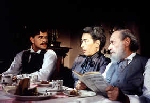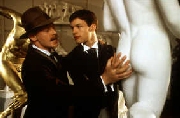When the American press dubbed Dr Magnus Hirschfeld "the Einstein of sex," the infamous Geman sexologist retorted that he would have preferred the pioneer of relativity to be known as "the Hirschfeld of physics."
Such humour is apparent in a new biopic of Hirschfeld by Rosa von Praunheim, Der Einstein des Sex - Leben und Werk des Dr Magnus Hirschfeld (The Einstein Of Sex - The Life And Work Of Dr Magnus Hirschfeld, 1999), a humour that is surprising for a gay Jewish Socialist sexologist working in Germany in the Nazi era.
Upon the death of his parents, Hirschfeld was taken in and brought up by his uncle, Onkel von Hirschfeld (Gerry Wolf), and aunt, Tante Gesche (Christa Pasemann). They remain loyal to him, though are often bemused by his actions.
He discovered his sexuality at university and in 1897 founded the first ever gay political association. In 1920, he finally realised his dream and opened his Institute for Sexual Studies.
But, whilst in public he promoted a liberal attitude towards sexuality, his personal sexual preferences were guarded from the outside world. It is inferred that he believed that any respect he had gained by academics might be thwarted by the public knowledge of his own sexuality. Thus, his love affairs are marred by secrecy.
Von Praunheim gives us insights into the prejudice that Hirschfeld had to deal with and the relationships he had with those closest to him. The transsexual Dorchen, who became his housekeeper and lifelong friend is in turn hilariously and pathetically portrayed by Tina die Göttliche, demonstrating both Hirschfeld's need for stability in the home and his sympathy for those who are outcasts.
Prejudice but little pride
 |
| Distanced lover |
The humour in the film is often represented by phallic displays. Hirschfeld's Institute houses a museum of the most mind-boggling sexual stimuli. When visiting a friend who researches testicles, Hirschfeld brings him the gift of a pair of tattooed balls belonging to the Chinese Emperor's brother. Not to mention the intriguing 19th-century wooden masturbating contraption, which Hirschfeld himself uses - a device which really has to be seen to be believed.
The fate of Hirschfeld's Institute with the rise of Hitler's popularity is unfortunately all too predictable. It is looted, and books are burned by the National Socialists in 1933 whilst Hirschfeld is away from Germany. Only his lover and Dorchen remain to defend the Institute in vain. Nothing is known of their fates. Hirschfeld himself died two years later in Nice.
 |
| Shocking the relatives |
Von Praunheim's Der Einstein Des Sex reminds us of a historical figure worthy of attention whom the National Socialists wanted to banish into oblivion. Given that his name is relatively unknown, we can, perhaps, consider that they succeeded in some way. One can only hope that as many people as possible will go to see this film to make sure that the Nazis' intentions are well and truly thwarted and that Hirschfeld gets the recognition he deserves.
Elke de Wit, 17 April 2000
Andreas Kleinert's Wege in die Nacht |
Veit Helmer's Tuvalu |
Sebastian Schipper's Absolute Giganten |
Frieder Schlaich's Otomo |
Bernd Eichinger's Der Große Bagarozy |
Thorsten Schmidt's Schnee In Der Neujahrsnacht |
Doris D�rrie's Erleuchtung Garantiert |
Leander HauĂźmann's Sonnenallee |
Maren-Kea Freese's Zoe |
Click here for the Berlinale website |
Moving on:
- Return to the CER front page
- For more articles on Central and East European film see the Kinoeye Archive



